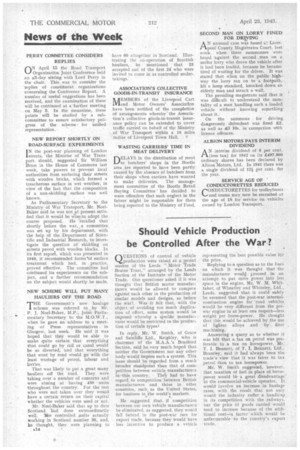Should Vehicle Production be Controlled After the War ?
Page 16

If you've noticed an error in this article please click here to report it so we can fix it.
QUESTIONS of control of vehicle production were raised at a recent session of the Leeds "Motor *Trade Brains Trust," arranged by the Leeds Section of the Institute of the Motor Trade. One questioner asked if it was thought that British motor manufacturers would be allowed to compete against each other in the production of similar models and designs, as before the war?. Was it felt that, with the object of avoiding too much duplication of effort, some system would be imposed whereby a specific manufacturer would be restricted to the production of certatn types?
In reply, Mr. W. Smith, of Grace and Sutcliffe Ltd., Keighley, who is chairman of the M.A.A.'s Bradford Section, said he very much hoped that neither the Government nor any other body would impose such a system. This issue should be regarded from a much broader standpoint than that of competition between vehicle manufacturers in 'this country. They had to have regard to competition between British manufacturers and th6se in other countries, such as the United States, for business in 'the world's markets.
He suggested that. if competition between our own Vehicle manufacturers be eliminated, as suggested, they would fall behind in the post-war race for export trade, because they would have less incentive to produce a vehicle
representing the best possible value for the price.
Replying to a question as to the lines on which it was thought that the manufacturer woul4 1,roceed in an attempt to put mere power into less space in the engine, Mr,. W. M. Whittaker, of Wheatley and Whiteley, Ltd., Leeds, suggested that it could safely be assumed that the post-war internalcombustion engine for 'road vehicles would be very different from the prewar engine in at least one respect—less weight per horse-power. He thought that this would be achieved by the use of ' lighter alloys and by finer machining.
Answering a query as to whether it was felt that a tax on petrol was pres ferable to a tax on horsepower, Mr.T. I. Bennett, of T. I. Bennett, Ltd., Bramley, said it had always been the trade's view that it was' fairer to tax petrol than to tax horsepower.
Mr. W. Smith suggested, however, that taxation of fuel in place of horsepower would be a great disadvantage to the commercial-vehicle operator. It would' involve an increase in haulage rates, with the result that not only would. the industry suffer a handiap in its competition with the railways. but the price Of goods carried would tend to increase because of the additional cost—a factor' which would be unfavourable to the country's export trade.




















































